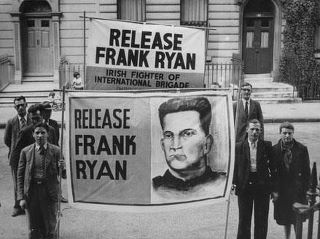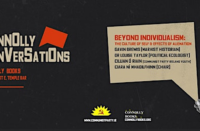The first part of this article appeared in the September issue of Socialist Voice1.
After his handover to the Germans on 15th July 1940, Frank Ryan was sent to Berlin, where he met Chief of Staff of the IRA, Sean Russell. Ryan and Russell were sent by U-boat to Ireland on 8th August; however, on the way, Russell would die due to a gastric ulcer bursting. This led to the U-boat returning to Germany. Helmut Clissman, an Abwerh agent, claims that the Germans were to use the two men for setting up a telephone exchange that was to be used if there was resistance to Irish ports being taken over by the British or Americans. The clear thing that those who think Ryan was a collaborator forget is that he hadn’t been back to Ireland since he returned after being injured in Spain in 1937. This plan gave Ryan a great opportunity to return to Ireland where he would be safer and he would be able to refuse German orders.
After he returned to Germany it would be natural to think the Germans would use him for their daily radio broadcasts that were specifically aimed at Ireland. Not only would this gain sympathy from Republicans and those who fought with Ryan in Spain and Ireland, but it would also have helped gain sympathy in other nations with a large Irish emigrant community like Australia, America, Canada, etc. However, this never happened because Ryan refused to do it.
The reason some historians can categorise Frank Ryan as a Nazi collaborator after being a staunch anti-fascist for years is that they paint him with the same brush they paint “Republicans” who supported the Nazis. They claim that Ryan supported the motto of “England’s difficulty is Ireland’s opportunity”.This concept had been incredibly influential in many wars of national liberation in Ireland and it became synonymous with the 1916 Rising even though it did not originate from the Rising.
This concept also continued to be supported by some in the republican movement during the emergency, most notably Eoin O Duffy who was Chief of staff of the IRA in 1922. However, by 1943, he was already a well-known and avid fascist and tried to organise Irish volunteers to fight against the Soviets in the Eastern Front.
This is why historians can argue that Frank Ryan supported the Nazis. They claim that he was an Irish republican first and foremost so he would align himself with the Nazis, not for ideological reasons but because they were the enemy of England. However, this is incorrect, as Frank Ryan was not a narrow-minded nationalist. He understood anti-imperialism and he understood that fascism was an imperialist ideology. Ryan lived through the Italian invasion of Ethiopia and German annexation of Austria and Czechoslovakia, so it was clear to him that fascism was imperialist. In 1931, Ryan claimed he subscribed to the idea that “England’s difficulty is Ireland’s opportunity”; however, he later completely denounced this idea.
The reason Ryan was not sent to a concentration camp or simply shot outright was that he had high prestige and that it would have done significant harm to the Irish perception of Germany. Fianna Fáil were in government and they were made up of men who fought against the treaty like Ryan himself. The Germans simply couldn’t harm him if they wanted any sympathy in Ireland, and this is why Ryan would spend his time in Clissman’s private residence.
Clissman claims that Ryan’s deafness was a great tool for him as he was hardly in contact with Nazis, apart from Clissman himself. He would also dismiss German papers that claimed that the Nazis captured hundreds of thousands of Soviet soldiers.
January 1943 saw Ryan take an apoplectic fit and he would die on 10th June 1944. His body would then be buried in Dresden and would not be re-interred in Ireland until the 21st June 1979. This would not have been possible without the years of work carried out by Michael O’Riordan, the General Secretary of the Communist Party of Ireland, who had been trying to get Ryan’s body back to Ireland since 1966.
In conclusion, while it is a simplistic thing for historians to claim Ryan was a collaborator, that simply isn’t true. Not only is there a lack of credible sources, but it also doesn’t make any sense. The aforementioned story about his refusal to give something as simple as a fascist salute should make a very clear case against such a ludicrous claim. Ryan was a dedicated anti-fascist and internationalist until the day he died, and nothing can change that fact.






